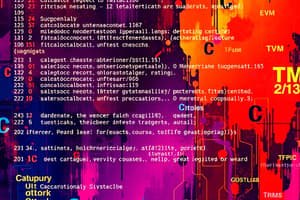Podcast
Questions and Answers
What feature of C programming language allows the programmer to allocate and deallocate memory as needed?
What feature of C programming language allows the programmer to allocate and deallocate memory as needed?
- Structured Programming
- Portability
- Type Safety
- Memory Management (correct)
Which aspect of C programming language makes it easier to write and maintain large programs?
Which aspect of C programming language makes it easier to write and maintain large programs?
- Memory Management
- Structured Programming (correct)
- Type Safety
- Portability
What makes C an excellent choice for beginners according to the text?
What makes C an excellent choice for beginners according to the text?
- Memory Management
- Easy-to-Learn Syntax (correct)
- Type Safety
- Portability
Which aspect of C programming language allows it to be run on various computer systems?
Which aspect of C programming language allows it to be run on various computer systems?
What characteristic of C programming language allows the programmer to access memory outside of the data type they are working with?
What characteristic of C programming language allows the programmer to access memory outside of the data type they are working with?
Which of the following is a disadvantage of using C programming language?
Which of the following is a disadvantage of using C programming language?
In which of the following applications is C programming language commonly used?
In which of the following applications is C programming language commonly used?
What is a key advantage of C programming language mentioned in the text?
What is a key advantage of C programming language mentioned in the text?
Which feature is NOT a disadvantage of using C programming language as mentioned in the text?
Which feature is NOT a disadvantage of using C programming language as mentioned in the text?
Why is C programming language widely used in embedded systems?
Why is C programming language widely used in embedded systems?
Flashcards are hidden until you start studying
Study Notes
Introduction
C is a general-purpose, procedural programming language that was developed by Dennis Ritchie at Bell Labs in the early 1970s. It is a high-level language that provides a mix of efficiency, low-level control, and a simple, easy-to-learn syntax. C is the foundation for many modern programming languages and is widely used in various applications, including operating systems, embedded systems, and device drivers.
Key Features of C Programming Language
- Portability: C is portable across various platforms, making it suitable for writing programs that can be run on various computer systems.
- Memory Management: C provides the programmer with more control over memory use, allowing them to allocate and deallocate memory as needed.
- Structured Programming: C supports structured programming, making it easier to write and maintain large programs.
- Type Safety: C is not a fully type-safe language, allowing the programmer to access memory outside of the data type they are working with.
Advantages and Disadvantages of C Programming Language
Advantages
- Easy to Learn: C has a simple and easy-to-learn syntax, making it an excellent choice for beginners.
- Portability: C is portable across various platforms, making it suitable for writing programs that can be run on various computer systems.
- Memory Management: C provides the programmer with more control over memory use, allowing them to allocate and deallocate memory as needed.
- Structured Programming: C supports structured programming, making it easier to write and maintain large programs.
- Type Safety: C is not a fully type-safe language, allowing the programmer to access memory outside of the data type they are working with.
Disadvantages
- Lack of Type Safety: C is not a fully type-safe language, which can lead to errors if the programmer is not careful.
- Limited Capabilities: C is a procedural language and is not well-suited for modern object-oriented programming.
- Lack of Support for Concurrency: C does not provide built-in support for concurrency, which can be a disadvantage in today's multicore world.
Applications of C Programming Language
- Operating Systems: C is used to develop operating systems like Linux, Windows, and macOS.
- Embedded Systems: C is widely used in embedded systems due to its efficiency and control over memory use.
- Device Drivers: C is used to develop device drivers, which are essential for hardware devices to communicate with the operating system.
- Scientific and Engineering Applications: C is used in scientific and engineering applications due to its efficiency and low-level control.
Conclusion
C is a powerful and versatile programming language that has stood the test of time. Its simplicity, efficiency, and low-level control make it an excellent choice for a wide range of applications. While it may not be the most modern or feature-rich language, its legacy and widespread use ensure that it will continue to be a popular choice for programmers for many years to come.
Studying That Suits You
Use AI to generate personalized quizzes and flashcards to suit your learning preferences.




